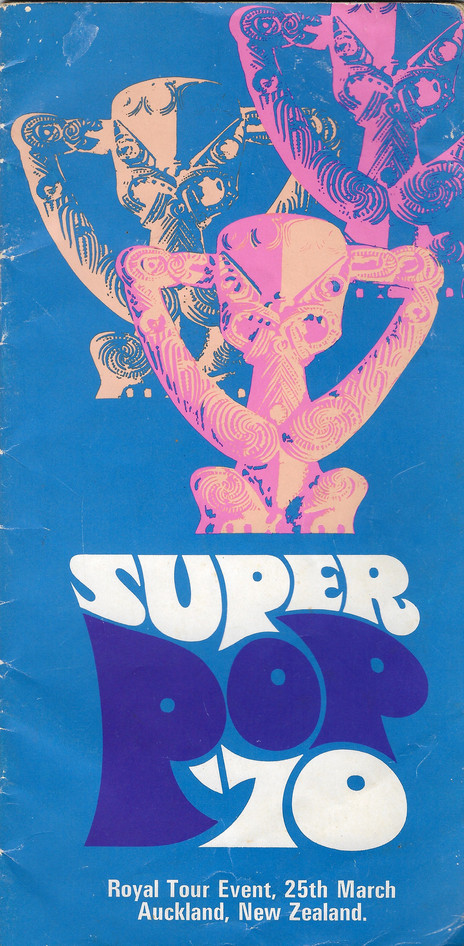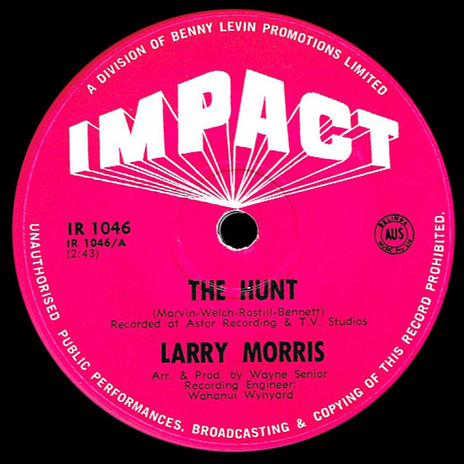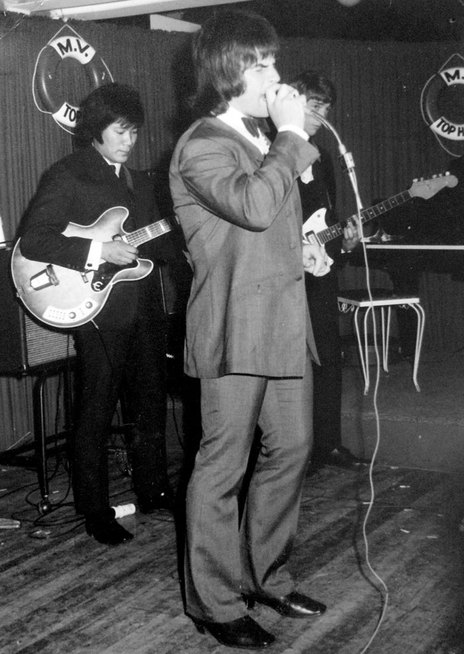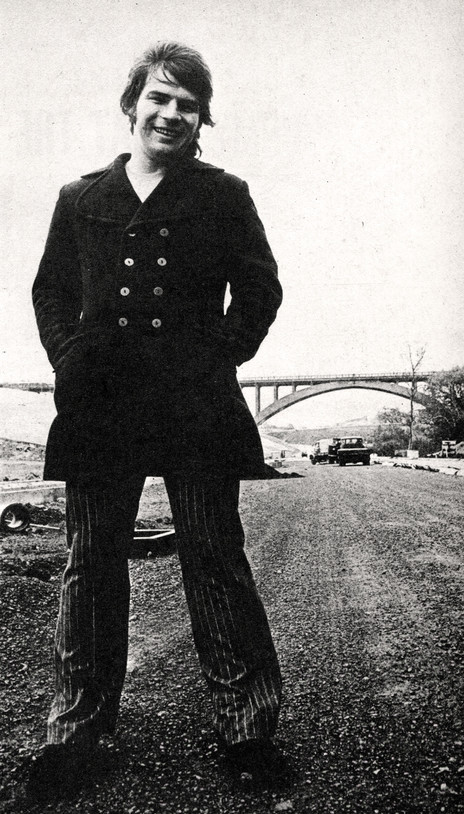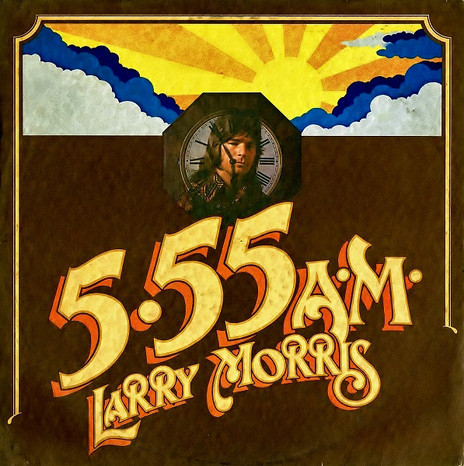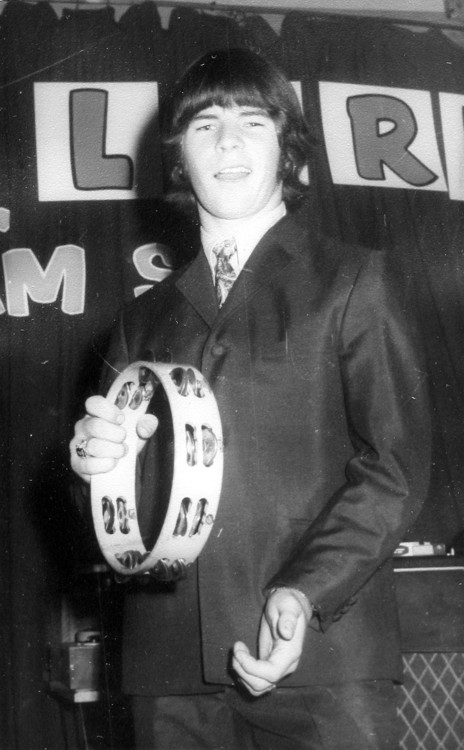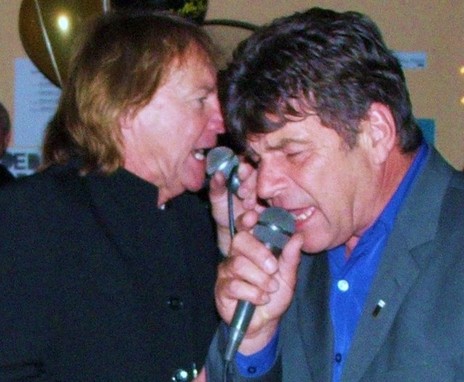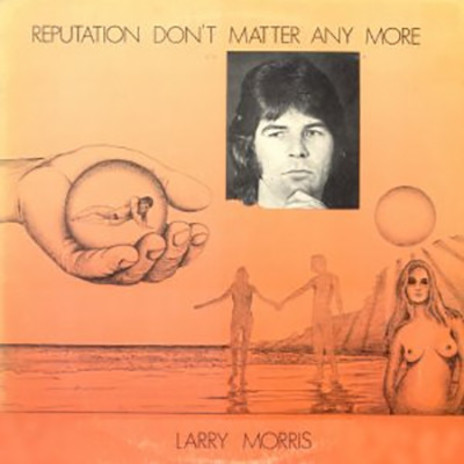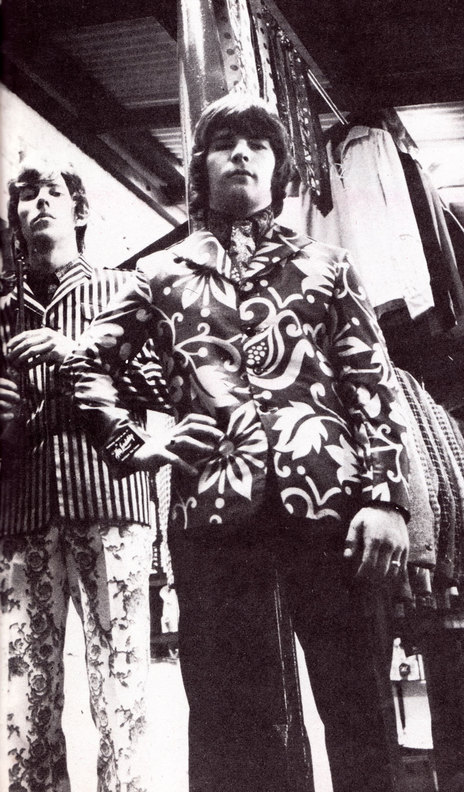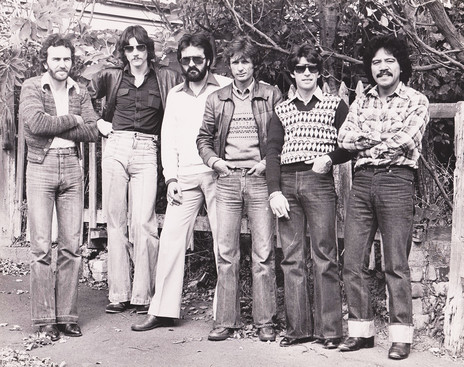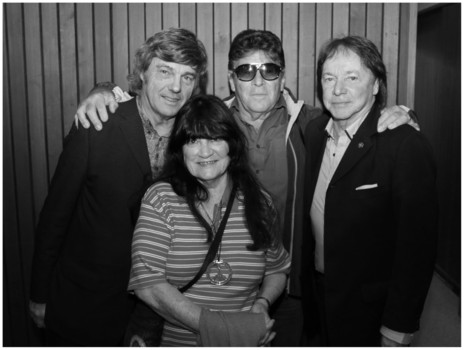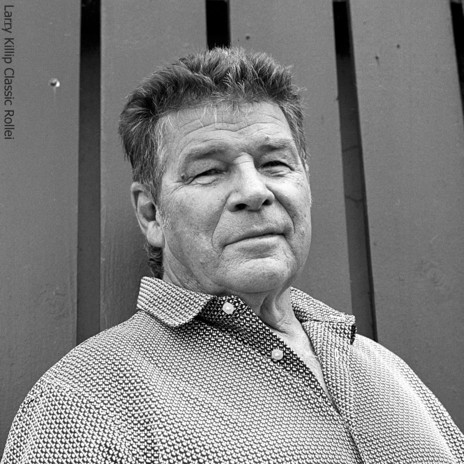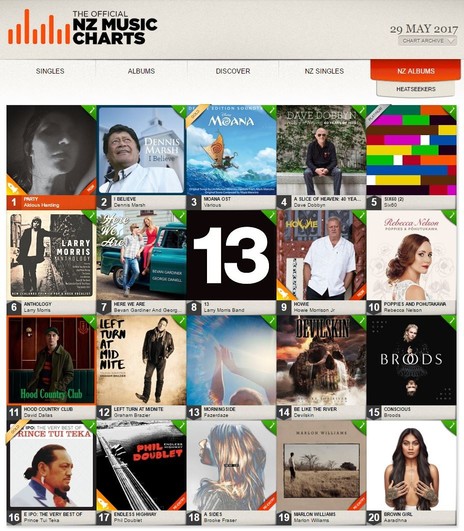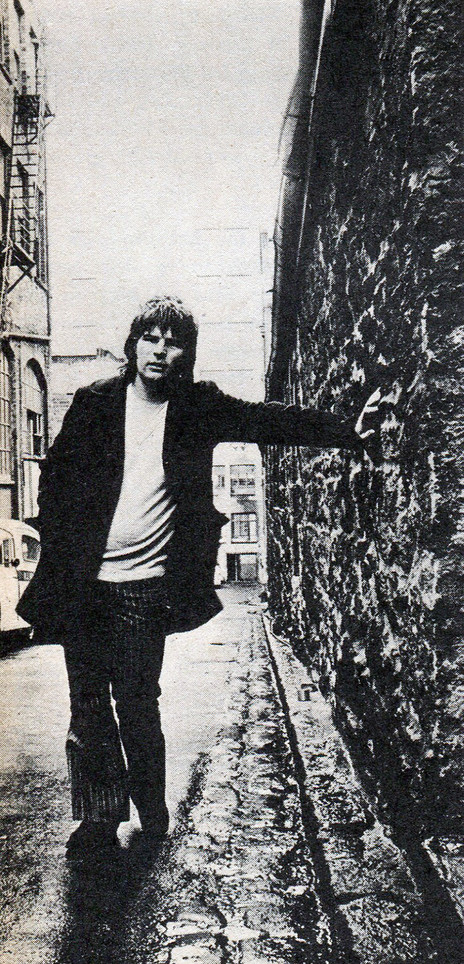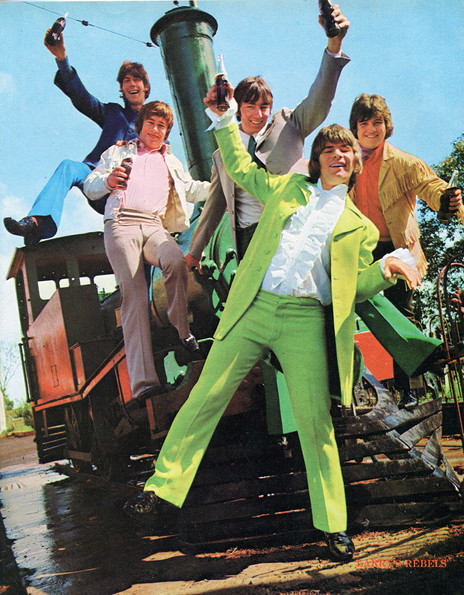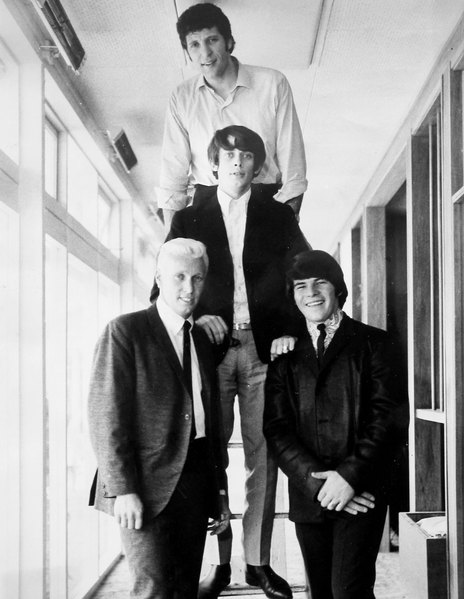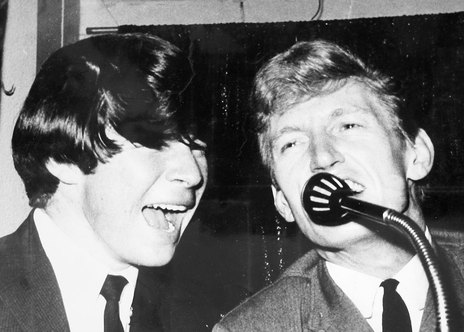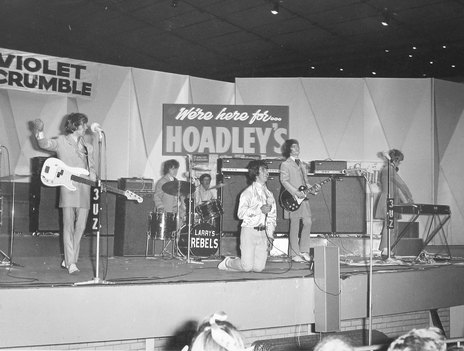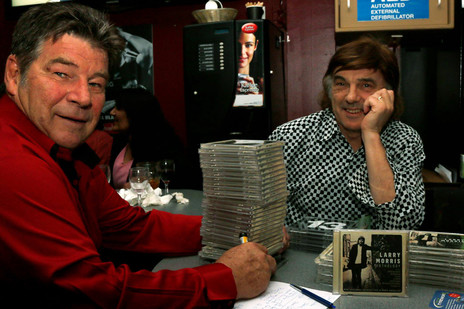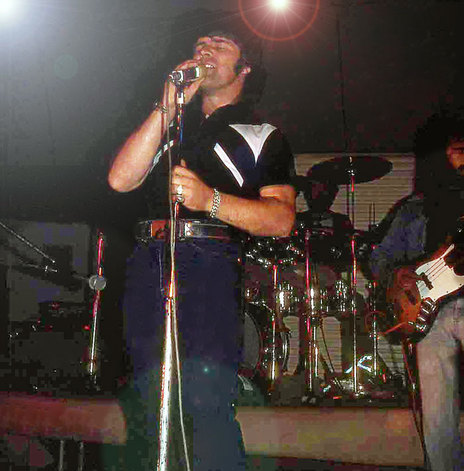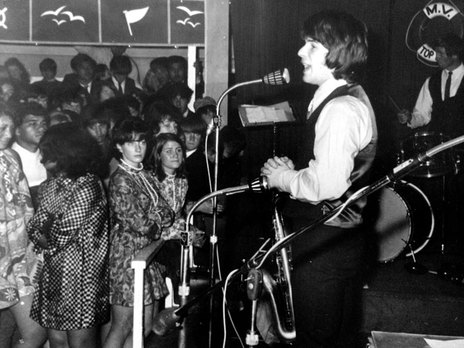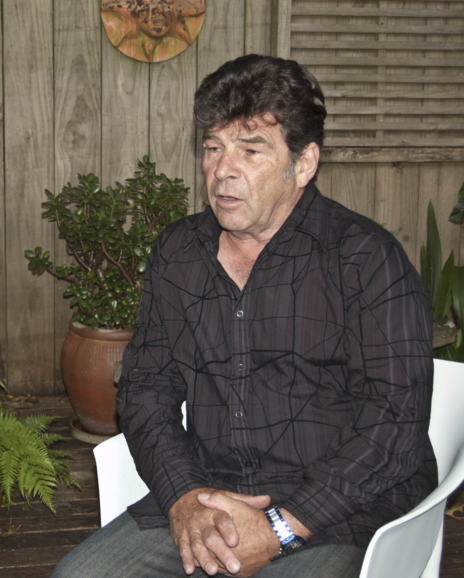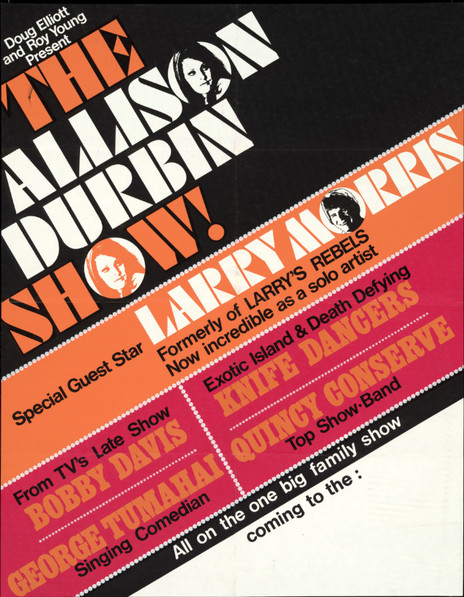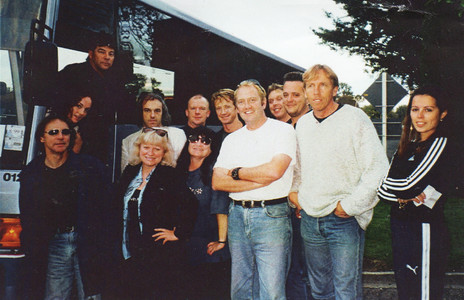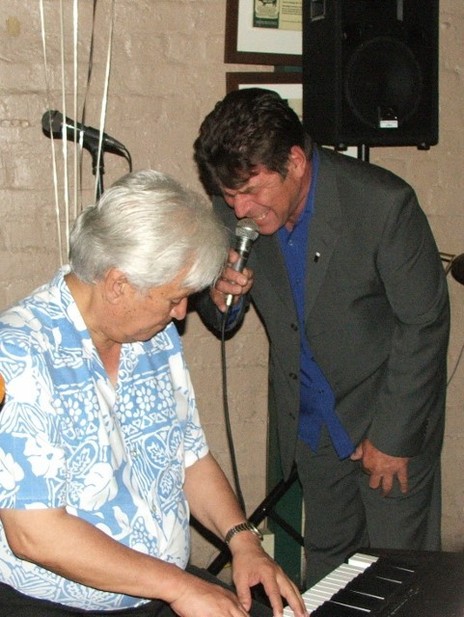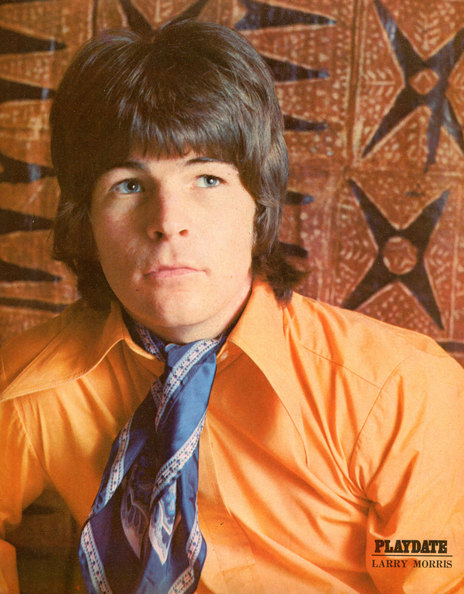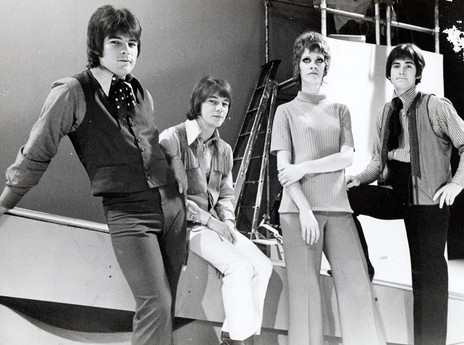Larry commenced school at Richmond Road Primary then, when John became a trouble-shooter for Farmers, they moved to Papatoetoe where Larry attended Ōtara Intermediate. At Papatoetoe High School he played representative soccer and softball, tennis and golf.
He learnt some songs and got up at parties to sing along with the record player.
Around this time Larry heard Elvis Presley singing ‘Jailhouse Rock’ and talked his father into taking him to see the film; he learnt some songs and got up at parties to sing along with the record player. Another early influence was at age 14, visiting the Montmartre coffee lounge in Lorne Street with his stepfather and talking the bouncer into letting them watch Tommy Adderley perform, accompanied by pianist Mike Walker. It was just a few songs, he recalled, “but enough to build a dream on”.
His stepfather’s job kept the family on the move: south to Manurewa, then Palmerston North, Ngāruawāhia, Taumarunui. Larry got fed up with forever starting at new schools and at age 15 he was attracted by a huge sign saying, “See the world! Be a man! Join the Navy!”
So he did. He began training at Devonport Naval Base and nine months later sailed out on the HMNZS Rotoiti. Once out on the ocean, Larry became violently seasick while on night watch. He left his post to vomit over the railings and was immediately arrested and thrown in the brig where he became aggressive. His stepfather drove straight up from Taumarunui and spoke for him at the court martial and Larry was discharged without conviction.
Larry joined his parents in Taumaranui and found a job at the Mananui Sawmill where, while unfreezing pipes one cold morning, he mistakenly filled his burner with petrol instead of diesel. The resulting explosion burnt the building down and Larry hurriedly left town the next day. His parents moved to Auckland and bought the Dairyland Milk Bar on Jervois Road in Herne Bay then helped Larry find part-time work at Moriarty Car Yards.
They renamed the band Larry’s Rebels and won a residency at the Top 20 Nightclub
Local emcee Johnny Watson arranged for Larry to attend one of Benny Levin’s talent auditions in 1964 and, although the promoter didn’t see any potential in Larry, the backing band was looking for a lead singer. The musicians invited Larry to join them. A residency at the Top 20 Nightclub followed in early 1965, which is when they came to the notice of Russell Clark. This led to a recording contract with Philips, a name change from The Rebels to Larry’s Rebels, and a management contract with Clark and Benny Levin. After some promising recordings on Philips (‘This Empty Place’, ‘Long Ago, Far Away’), Clark and Levin founded the Impact label to release their artists’ recordings.
In early 1966 Larry’s Rebels toured the country with Tom Jones and Herman’s Hermits . At year’s end – in an attempt by their manager Russell Clark to promote a clean-cut image – the band performed a service at the Zion Hill Methodist Church in Birkenhead, swelling the congregation from 30 to 300.
In January 1967 Larry’s Rebels supported The Yardbirds (featuring Jimmy Page), The Walker Brothers, and Roy Orbison on a whirlwind four-city New Zealand tour over four days. In April, they toured with Eric Burdon and the Animals, Dave Dee, Dozy, Beaky, Mick and Tich, and Paul and Barry Ryan. The Australian management of the tour was so impressed by Larry and the Rebels that they included them in the Easybeats’ homecoming tour after their international success.
Larry’s Rebels’ debut album A Study in Black followed. The single ‘Painter Man’ had steady sales until there were complaints that Larry sang “shit-cans” in the third verse, instead of “tin cans”. (Apparently an attempt at double-tracking the line miscued, creating the impression he sang “shit-cans”.) The NZBC upheld the complaint and banned it but not before the single reached No.6 on the national charts.
The breakout single from A Study in Black was ‘Let’s Think of Something’, written by Auckland musician Roger Skinner. The single reached No.4 on the national charts while the group was on another tour of Australia. (Skinner’s song won the year’s APRA Silver Scroll.) The band returned home to appear on the National Golden Disc Spectacular tour with The Avengers, The Gremlins, Mr Lee Grant, Ray Woolf and Sandy Edmonds.
Larry nearly drowned during a promo stunt in which he dived, wearing a suit, into Waitematā Harbour to “save” Miss Auckland. The band returned to Melbourne where they performed to an audience of 150,000 at the Moomba Festival. ‘Everybody’s Girl’ hit No.6 in New Zealand, but Australia proved too tough to crack and the band returned home to a successful Blast Off ’68 tour, with Johnny Farnham, Ray Woolf, The Hi-Revving Tongues, Gene Pierson, and Mike Durney.
By now the pressure was on; Terry Rouse suffered a nervous breakdown and left the group. Then, after a row with Levin and Clark over accommodation, Larry decided that enough was enough. He quit Larry’s Rebels 30 minutes before they were due on stage, an action that he deeply regretted in later years.
Larry released a string of singles: ‘The Hunt’, ‘The Game’, ‘Bad Moon Rising’, and ‘Juliette’.
As a solo act, Larry gained a residency on NZBC TV’s C’mon 69, performed at a huge Sheltered Workshops charity concert at Western Springs, the Super Pop 70 concert for Prince Charles and Princess Anne during their 1970 New Zealand visit, was a resident act on TV show Happen Inn and joined the breweries pub circuit. Russell Clark found him cabaret work in Tahiti, he worked Tommo’s Place nightclub in Auckland, and released a string of singles: ‘The Hunt’, ‘The Game’, Creedence Clearwater Revival’s ‘Bad Moon Rising’, and ‘Juliette’.
In December 1970 police found traces of marijuana in the ashtray of a rental car and threatened to arrest the entire entourage until somebody owned up. Larry took responsibility and three months later pleaded guilty and was fined $60. The NZBC banned him from television and radio and he lost his club and pub gigs, but his mates rallied to his cause. Pianist Mike Walker invited Larry to sing with his jazz trio at The Embers nightclub, Barbara Doyle became his manager and gave him a residency at her Ranch House Restaurant, and Tommy Adderley booked him into his Granny’s club. By the end of 1971 the NZBC ban was lifted and Larry signed to Polydor, releasing two singles, then in 1972 Barbara Doyle’s Gemini Records released his first solo album, 5.55 am.
Returning from a season in Tahiti, Larry was arrested for possession of LSD for supply, and was sentenced to seven years’ prison, backdated six months for the time he had already done. Years later, he described his four years in prison as “frightening. Terrifying.” While in Pāremoremo he lost the top joint of his index finger during a riot in the finishing shop and he assisted in the failed escape of Mervyn Rich, donating his hair for a dummy in his cell. The prisoners nicknamed him “Stardust” after the 1974 film.
Larry was released in December 1975 and Hugh Lynn hired him as promotions manager for his Crazy Shirts shop, which distributed Black Sheep jeans and skate boards. Barbara Doyle reinstated him at the Ranch House and he returned to the breweries circuit with a cabaret-style floorshow, toured with Tommy Adderley’s Headband and then hit the beach resorts with Hello Sailor.
In late 1976 he founded Moon Records which, through EMI, released his single ‘Laugh for Me’ and the album Reputation Don’t Matter Anymore. Recorded with a stellar lineup of New Zealand musicians, and arranged by Jimmie Sloggett, Reputation featured songs Larry had written in prison.
He was hired as support for David Bowie’s 1978 Western Springs gig, then formed the band Shotgun, a virtual supergroup of seasoned local musicians: keyboardist Bob Smith, guitarists John Parker and John Kristian, Bob Jackson on bass, and Billy Nuku on drums.
With Hugh Lynn, Larry bought Mascot Recording Studios from Muriel Barton in 1978 in a pay-when-you-can deal. Glen Moffatt wrote for AudioCulture that Shotgun “set up base at Mascot Recording Studios and released the single ‘Taste Of The Devil’ on Vertigo, but by the end of 1979 they were no more. The diverse, intense personalities could be hard going and their slightly outdated material was out of step when sharing the same bills as Midnight Oil, Sheerlux and the like.”
In August 1980 Larry moved to London to try to break into the UK music scene but was unable to pick up much work as a singer in the post-punk era. As manager of an electronics shop, he earned enough to bring over his new family, Helen Biggs and baby Rachel, but they all eventually returned to Auckland in 1982.
Larry and his band took over a residency at the Numbers Club for five months then moved to the Foundry Nightclub on Nelson Street until it became too dangerous to play in 1984. Pianist Mike Walker recalled, “Man, that place was wild. It was so packed you couldn’t move. There’d be fights and blood amongst the mayhem and some nights there’d be security on stage watching out for the next bit of trouble.”
He spent much of the 1980s in Hollywood, Mixing with Max Merritt, Renée geyer, Brian Cadd, and Robert Raymond.
After his breakup with Helen, Larry decided to head for the United States but because of his drug convictions he had to illegally cross over from Canada. He spent the next six years in Hollywood partnering a music-publishing house with Great Ngāruawāhia Music Festival co-organiser Robert Raymond, and writing and recording jingles with Max Merritt and Australian musician Brian Cadd. Larry knew them both from his Melbourne days. He moved to Alabama for two years then bought a CD store in Orlando, Florida. When songwriter and producer Cadd relocated to Nashville in 1989 and opened his Salad Bowl studio, Larry regularly made the 12-hour drive to sing on his demos.
Larry, his third wife Nancy and their two sons, Luke and John-Henry, flew back to Auckland in 1993, to find that his mentor Tommy Adderley had died while the family was in transit. Larry helped arrange Adderley’s benefit concert at the Gluepot, and he enjoyed singing so much with three ex-members of Cairo that he joined forces with them for many years. Renamed the Larry Morris Band, they recorded an album called Here and There (1994) at Auckland’s Revolver and Cadd’s Nashville studio. For several years they held down a residency at the Pig and Whistle pub in Rotorua, and in 1999 they performed at the Louis Vuitton Challengers Ball for the America’s Cup.
Larry was kept busy doing voiceovers for advertisements and fronting his band. In December 2001 he took a group of 35 entertainers to East Timor to entertain the New Zealand peacekeeping force, bankrolled by Sir Peter Leitch, and received a special commendation from Prime Minister Helen Clark who called him a “New Zealand rock icon”. He also took part in Pacific Entertainment’s 2006 Best of the Best nationwide tour with Ray Columbus, Sharon O’Neill, Tom Sharplin, Johnny Devlin and Shane. When Ritchie Pickett died in 2011, Larry arranged two memorial concerts in 2012 and 2016 and created a Ritchie Pickett Music Scholarship at Cambridge College to purchase instruments and support talented students.
Larry Morris was inducted into the New Zealand Music Hall of Fame in 2020 as part of Larry's Rebels.
A major setback occurred in 2005 when Larry’s car left the road returning from a New Year’s Eve gig in Rotorua; doctors discovered a faulty heart which needed surgery. In 2015 he married his fourth wife, Gloria.
Regarded as a “lovable rogue”, with countless friends, Larry was the recipient of many awards. In 1976, six months after his release from prison, he was nominated for Entertainer of the Year along with Brent Brodie and winner John Clarke. Amnesty International awarded Larry and his band a Supreme Award in 2000. He joined the Variety Artists Club in 2007 and was vice-president from 2009 to 2011. He received a VAC Scroll of Honour in 2008 and the Benny Award in 2013. He has a star on the Orewa Walk of Fame along with Graham Brazier, Ray Columbus, Tom Sharplin and Sir Howard Morrison (the award was accepted by his friend Shane Hales in September 2011 as Larry was away touring). In 2017 Grant Gillanders’ Frenzy label released Anthology, a compilation of Larry’s solo recordings, EMI released Larry’s Rebels 1965-1969, and the Larry Morris Band 13, a selection of favourites from the group's live setlist. He was inducted into the New Zealand Music Hall of Fame in 2020 as part of Larry’s Rebels.
Larry passed away on 18 January 2023 after a long illness. His death was widely reported by mainstream and social media, reflecting the affection towards one of the characters – and great voices – of New Zealand music.
Comments made in the past had already showed his influence. Marc Hunter, who grew up in Taumarunui, said in the 1980s, “Larry Morris is the whole reason that me and Todd started Dragon.” Mike Chunn, whose Citizen Band covered ‘I Feel Good’, has said, “I got into music because of Larry Morris and the Rebels”. NZ Musician magazine summed his contribution: “When you hear Larry Morris backed by some of New Zealand’s hottest musicians, you’re hearing the past, the present and the future of New Zealand rock’n’roll music.”
